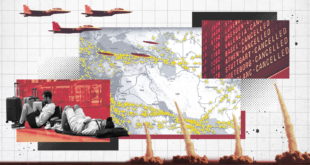 TEHRAN (Fars News Agency)- Iran may become a “major” gas supplier to neighboring Persian Gulf Arab states even as the US pushes for more sanctions against the Islamic Republic, the head of an Abu Dhabi state-controlled energy company said.
TEHRAN (Fars News Agency)- Iran may become a “major” gas supplier to neighboring Persian Gulf Arab states even as the US pushes for more sanctions against the Islamic Republic, the head of an Abu Dhabi state-controlled energy company said.
Abu Dhabi National Energy Co. is holding “preliminary discussions with Iran about gas being landed in the United Arab Emirates,” Chief Executive Officer Peter Barker-Homek told reporters in Abu Dhabi Thursday. The UAE needs the gas to fuel its power plants, he said.
At a meeting of Persian Gulf Arab heads of state in Qatar Dec. 3, Iranian President Mahmud Ahmadinejad offered to supply countries including the UAE and Saudi Arabia with gas and water in a bid to strengthen regional ties and free the area of “foreign influence.”
Abu Dhabi, which owns the world’s fifth-biggest gas reserves, started importing the fuel from neighboring Qatar this year because its own deposits are too high in sulfur, making the gas costly to process for commercial use.
“The economic logic of the arrangement is overwhelming and will eventually trump the geopolitical opposition to doing business with Iran,” said Anthony Harris, former UK ambassador to the UAE.
The Persian Gulf states, particularly the UAE and Oman, have no choice but to seek Iranian gas if they are to generate the electricity they need to grow.
Abu Dhabi National, known as Taqa, plans to expand its power generation capacity by 78 percent to 16,000 megawatts in the next five years. Moody’s Investors Service says the UAE’s electricity demand is rising 9 percent a year on the federation’s oil-fueled economic boom.
The UAE, separated from Iran by the narrow Strait of Hormuz, was expecting to receive gas from the country in November 2005, according to an agreement signed by Sharjah-based Crescent Petroleum Co. in April 2001. The gas has since been delayed as Iran, owner of the world’s second-biggest reserves after Russia, demands a higher price.
The gas will come eventually, said Barker-Homek, who expects increasing regional codependence.
“The UAE is Iran’s biggest trading partner,” said Dalton Garis, economics professor at the Abu Dhabi Petroleum Institute. “Iran needs money, and 99 percent of the UAE’s energy demand is natural gas, so it’s a match made in heaven.”
Iran has made several overtures in recent months to pursue projects with other countries. On Thursday, the nation’s foreign minister said during a visit to Russia that the two countries would be forming a joint venture to develop gas deposits in the Persian Gulf and Central Asia.
Of the other nations receiving Iranian gas, Oman aims to import at least 1 billion cubic feet a day under a $2 billion proposal, Oil Minister Mohammed al-Rumhy said in a Dec. 10 interview. Bahrain signed a preliminary agreement of a similar size with Iran last month.
In November, National Iranian Gas Export Co. released a list of 15 countries with which it is negotiating for gas exports, including the UAE, IHS Energy Group’s Middle East Director Stuart Lewis said by telephone Thursday from Tetbury, England.
“At the same time, Iranian domestic consumption is soaring, and these two reasons are prompting increasing gas exploration in the country,” Lewis said.
In return for the gas supplies, Taqa is proposing to build a liquefied natural gas plant in Iran, Barker-Homek said, without being more specific.
Taqa has spent $11 billion of the Persian Gulf state’s burgeoning oil revenue on overseas acquisitions this year, taking its total assets to $21 billion, Barker-Homek said. Next year, the company will make “one or two larger acquisitions” in the midstream or downstream areas – pipelines or processing plants – rather than in exploration and production, otherwise known as upstream.
 Eurasia Press & News
Eurasia Press & News


